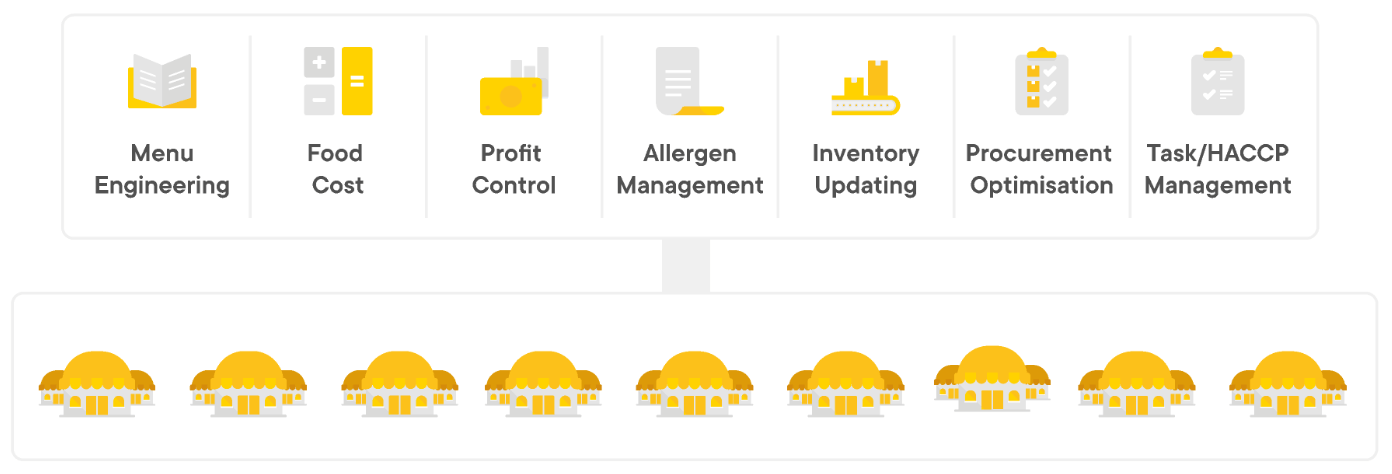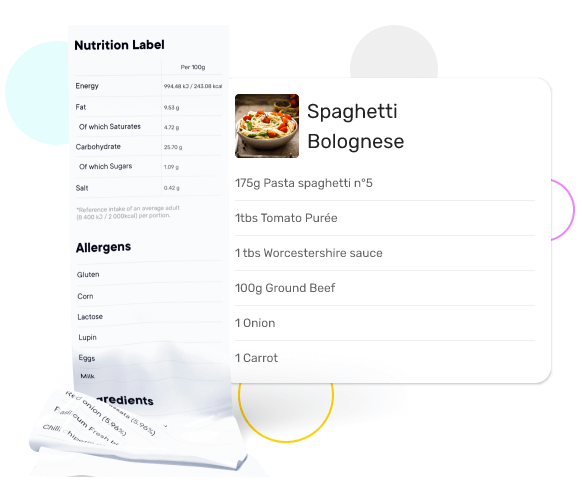Every restaurant operation should periodically take stock of its food allergen training methods.
In today’s post, we’ll talk about things to focus on in food allergy training, how to design that training, and why being an allergy-friendly foodservice business pays off.
Let’s dig in!
These are the topics we will be looking at:
- The state of food allergen training
- Why is allergen training important?
– A compliance requirement
– Process streamlining for multi-outlet restaurants
– Peace of mind for owners & managers - What to focus on when designing food allergy training for food handlers
– Managing the supply chain
– Knowing common food allergens
– Communication best practices
– Preventing cross-contact in the kitchen
– Recognizing & responding to food allergy emergencies
Recommended Reading:
Food Allergen Management – Full Breakdown for Restaurant Managers & Executive Chefs.
We’ve also included free allergen training materials – download our allergen quiz questions below and use them to assess the preparedness of your team.
Download Food Allergen Training Quiz
Help your front & back of house teams feel confident. Train their knowledge about common food allergens, allergic reactions, and allergy-friendly restaurant practices with a quiz.
The State of Food Allergen Training in the UK & US
While we’re confident that a lot of restaurants are doing their best to provide adequate food allergen training for their staff, that just might not be enough to reassure the public:

- A 2019 UK survey shows that 20% of restaurant workers don’t go through formal allergen training (with 65% servers saying that they wouldn’t know how to cope if faced with a customer suffering an allergic reaction).
- In the US, the numbers are even worse – out of 540 restaurant employees that participated in a recent CDC study, less than half have been formally trained on how to handle food allergens and react to allergy incidents.
As a restaurant operator, you know that customers need take their personal safety seriously – they must be open and forthcoming about their food allergies, otherwise, the BOF staff can’t take the necessary precautions to ensure a safe meal.
But, precisely because some of them don’t do that, these survey numbers don’t pass muster. If anything, poor regard for personal safety on the customer side should prompt restaurants to be even more vigilant when it comes to food allergen training.
A comprehensive training program minimizes allergy incidents and keeps your guests safe. In ideal situations, it allows you to create a bespoke meal that eliminates any possibility that a customer will suffer an allergic reaction at your restaurant. In less-than-ideal situations, it allows your employees to react swiftly and decisively if an incident does happen – a reaction that often saves lives.
The Importance of Allergen Training for Restaurant Staff

That said, while these statistics are unsavory, they do signal one thing – there’s an opportunity on the market for savvy restaurant operators.
By becoming an allergy-friendly restaurant (which includes top tier allergen training and food allergen management), you can tap into a currently underserved market segment.
Most allergy sufferers are extremely cautious eaters, but they’re also loyal customers. Once they find a restaurant that can satisfactorily cater to their needs, they keep coming back to it, and they tell their allergic friends.
In a nutshell, they’re good business.
Here are three more reasons why allergen training is not something that you should leave to chance.
Food allergen training is a compliance requirement
Every foodservice business in the European Union (post-Brexit UK included) is bound by the provisions of the EU FIC Food Information for Consumers legislation to provide accurate and timely information about food allergens.
This includes emphasizing food allergens on your menu, prominently featuring food allergy notices on the premises, and providing additional allergen-related information on request.
While the legislation does not require restaurants to organize allergen training sessions for their staff,
It explicitly states that:
Staff should know how to deal with allergen information requests , such as knowing how to pass customer queries to someone in the business who can help and provide the information.
EU FIC Food Information for Consumers legislation
In some cases, training is actually mandated. For example, in the state of Illinois (US), restaurant managers need to undergo accredited food allergen awareness and safety training and pass an exam in the first 30 days of being hired.
Failure to comply with allergen regulation opens you up to both criminal and civil charges. Even accidental slip-ups can be costly, ranging from fines to business shut-downs, not to mention the adverse impact on your reputation that comes with even being accused of not taking sufficient precautions to ensure customer safety.
Process streamlining for multi-unit food businesses

Managing a single location is often headache enough, but what happens when you have several outlets that require your attention?
You simply can’t do everything or be everywhere at once. This is where codified processes come to the rescue.
In the case of food allergens, training everyone on your teams to have a wide breadth of knowledge of – and the tools to minimize and deal with – allergy incidents, saves you a lot of time and money.
Outlet managers can now independently handle allergen-related situations, working hand in hand with their FOH and BOH teams to ensure appropriate allergen communication throughout. This includes ordering, managing and minimising cross-contact, and reacting to emergencies.
Easy allergen management and training with Apicbase
Allergen checks and nutritional value reports are taken care of, so you can focus 100% on food quality.
Peace of mind for restaurant owners & managers
If a customer suffers an allergic reaction while at your restaurant, the chances of it turning into a PR disaster are very high.
However, the worst can be avoided if you can demonstrate that you did everything in your power to prevent it from happening. This means that documented food allergen training needs to be at the core of your food allergen management system.
Additionally, this takes the pressure off of managers on an almost daily basis. Instead of sitting at the edge of their seat every time a food allergy sufferer walks through the door, they can now go about their work knowing that the potential for an incident is extremely low.

5 Things to Focus On In Allergen Training for Food Handlers
When it comes to allergy training, there is no one-size-fits-all solution. However, there are things that every training program has to include to be truly comprehensive. We’ve identified five of them for you to brush up on before designing and implementing your food allergy training.
1. Managing the Supply Chain
The only way for you to be successful when handling food allergens in-house is to have
systems in place that ensure control over what comes into your restaurant.
This means staying on top of your suppliers, checking and double-checking every order, and managing all ingredient changes by updating your food allergy matrices, recipes, and menus.
Even though suppliers are required by law to provide allergen information, there are times when they’ll argue that it’s cost-prohibitive for them to go into every single detail. If you ever hear that justification, it’s time to switch suppliers. Also, insist on getting written allergen checklists with every order, ask for information on the potential of cross-contamination, and the steps taken to avoid it.
Design your food allergy training in a way that exposes every kitchen staff member to the order and delivery process. You want to make sure that every chef can, at least, independently receive deliveries, and check them for quality, inconsistencies, and allergen information.
2. Knowing Common Food Allergens
It shouldn’t be too difficult to memorize a few things about a handful of specific ingredients and to find a substitute if one of them can’t be used. After all, there are only 14 major food allergens that you need to keep your eye on, right?
But what happens when the packaging is not so clear?
For example, did you know that whey and casein are dairy products? Or that that albumin is an egg protein? Ever heard of globulin, lecithin, lysozyme, or simplesse? All of these are also egg-specific proteins that can trigger an allergic reaction.
The list goes on.
Almost every allergen is sometimes labelled under an alternative name, and if your staff is not aware of that, they can inadvertently put a customer at risk.
Avoid that by making sure that everyone knows how to read labels and identify allergy-related proteins. Instruct kitchen staff to double-check everything when they’re preparing an allergy-free meal – labels, vendor specification lists, recent recipe changes, etc.
3. Communication Best Practices
In a restaurant operation, efficient communication is the key to success. Every customer deserves a safe and delicious meal, and that starts with FOH and BOH staff exchanging information without hiccups or mistakes.
Here are a few allergen communication best practices that can save your staff from making life-threatening (and costly) mistakes:
- Ask about food allergies – instruct your staff to inquire about potential allergies when taking bookings, or when seating customers at their table.
- Display food allergy notices prominently – put up food allergy posters warning customers about potential allergens and how to ask for additional information.
- Create specialized menus – having a few menus that contain allergy-friendly dishes only helps customers identify a safe meal faster.
- Supervise every allergen-free meal – once a customer notifies staff about their food allergy, it’s the manager’s duty to make sure that their dish is prepared safely.
- Institute a “no guessing” policy – phrases such as “this might be nut-free” or “I’m pretty sure that this is safe for you” should not feature in the vocabulary of your servers. Always double-check before giving out allergen-related information.
- Flag allergen-free orders – invest in POS software that allows servers to flag allergen-free orders as they take them.
- Label ingredients religiously – every ingredient in your kitchen needs to be properly labelled, and the label has to include allergen information.
4. Preventing Cross-Contact in the Kitchen
All it takes is a few micrograms of an allergen to cause a fatal allergic reaction. These cases are rare but they do happen – and if one happens on your watch, that’s one too many. Often, the culprit is poor cross-contact control in the kitchen, and that results with an allergen being accidentally introduced into a dish.
Cross-contact incidents can be managed by implementing strict procedures and policies, and by making sure that everyone on your team is fully aware of them.
- Identify cross-contact hotspots – storage areas, refrigerators, prep areas, stovetops, and fryers all need special attention when it comes to food handling, cleaning, and sanitization.
- Implement a rigorous hygiene policy – cover critical hygiene procedures with codified policies. This includes proper hand washing, equipment sanitization, workstation hygiene, and glove use.
- Have a designated prep station for allergy-free meals – if possible, have one pre area that’s always kept free of food allergens. Wash and sanitize the area before and after every use.
- Use color-coded equipment – have a separate set of cookware and utensils for making allergy-free meals, and make that they’re a different colour. Store this equipment in a sealed container and clean it before and after use. Consider using differently shaped/coloured plates for allergy-free meals.
- Assign one person to sensitive orders – the more people are involved in preparing an allergen-free meal, the more room there is for an error. Try to assign one kitchen staff member to sensitive orders.
5. Recognizing & Responding to Food Allergy Emergencies
One of the most important aspects of your food allergy training is to give your staff sufficient information on how to recognize food allergy symptoms, and how to cope if a customer suffers an allergic reaction on their watch.
Common food allergy symptoms include:
- Swelling of the tongue and lips,
- Hives, itching, redness, and skin rash,
- Coughing, wheezing, nasal congestion, chest pain, throat tightness, hoarse voice,
- Nausea, stomach cramps, vomiting, and diarrhea,
- A drop in blood pressure, dizziness, light-headedness, weak pulse, shock.
These symptoms don’t have to appear in any particular order. In mild allergic reactions, the most likely symptoms are swelling, coughing, and rash. However, they can worsen over an hour, and culminate in an anaphylactic shock.
To stay prepared and avoid the worst outcome, everyone on your staff should have sufficient training to stay calm and composed while assisting the unfortunate customer.
Take the following steps to increase the chances that an incident will have a positive outcome:
- Ask about Epi-Pen – if a customer discloses a food allergy, ask them immediately if they have antihistamine and an Epi-Pen on them (and where is it).
- React immediately – as soon as allergy symptoms become noticeable, call an ambulance. If the customer can talk, ask them if they believe taking antihistamine would help ease the symptoms.
- Administer Epi-Pen – if indicated, administer an Epi-Pen – do this without delay if the customer faints, starts shivering, or if their lips or tongue swell up.
- Ensure the customer is safe – if they’re vomiting, place them on their side, and check to verify that nothing is obstructing their airway.
- Contact next of kin – try to find out who to contact in case of an emergency – a parent/guardian or another emergency contact. If possible, check with the dining party.
- Follow up with them- stay with the customer until an ambulance arrives and they are taken to the emergency room. If the customer is alone and you are unable to reach their emergency contact, escort them to the hospital.
Take Food Allergen Training to the Next Level

Designing and implementing a program of this scope can seem like an overwhelming task. If at any point you start wondering if it’s all worth it, just remember why you’re doing it:
- When preparing someone’s meal, you have a duty of care – that meal does not have to be delicious (though we’re sure it will be!), but it does have to be safe.
- To comply with your local laws and regulations, you need to communicate allergen-related information clearly and unambiguously. This often requires you to provide formal food allergen training for food handlers and servers.
- Formalizing allergen training allows you to scale your operation more efficiently, knowing that every outlet is following the same set of procedures designed to keep customers safe.
And remember – Apicbase can help you get where you’re going faster!
Our restaurant management software has a built-in allergen module that helps you keep track of allergen-related information in recipes and menus.
This information is available to everyone in real-time – when clients say they’re allergic, the staff can immediately check if their menu choices contain any of the common 14 allergens.
Before you get to work on your allergy training program, don’t forget to download our allergen training questions.
Download Food Allergen Training Quiz
Help your front & back of house teams feel confident. Train their knowledge about common food allergens, allergic reactions, and allergy-friendly restaurant practices with a quiz.

